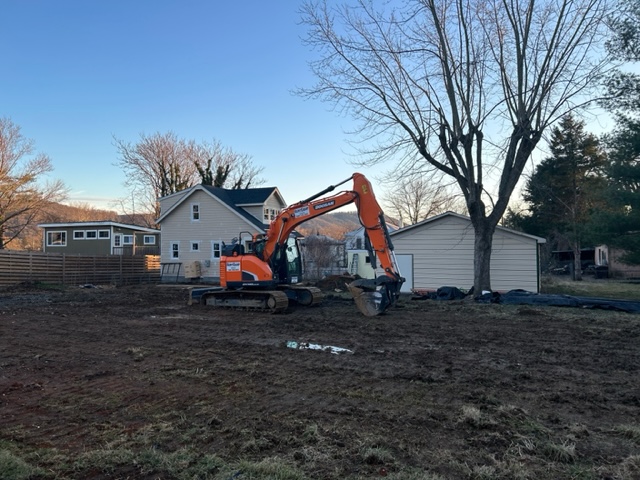The draft zoning map for Charlottesville points the way to a dense future for the city, all in the name of providing affordable housing. But the existing zoning still provides opportunities for additional residential density for those who can pay for it. Sometimes that means removing houses.
For example, a house built in 1893 at 704 Bolling Ave. in Belmont was demolished to make way for two new structures. Construction on the first, an accessory dwelling unit allowed under existing zoning at a cost of $195,000, began before the 19th-century building was torn down.
The work description for the demolition permit, issued on December 22, stated asbestos in the home would be removed prior to demolition. The toxic material was commonly used in construction for fire protection before its carcinogenic properties were realized, and all demolition or renovation requires a certificate describing whether the material is being handled correctly.
The cost to tear down 704 Bolling is listed in the application as $43,815. The property was last purchased in June 2021 for $400,000.
While the property does not have any historic protections, it was built by the Belmont Land Company as part of one of the first expansions of Charlottesville in the last decade of the 19th century. The name Bolling comes from one of the vice presidents of that firm.
Another house at 615 Bolling Ave. sold on January 30 for $760,000, after extensive renovations, for $180,000 over the 2023 assessed value. The original house was built in 1920 and last purchased in January 2021 for $165,000, or about $50,000 under the assessed value that year. That purchaser began work, but was told to stop because the asbestos certificate had not been turned in. Only then did the owner apply for building permits for renovations of the existing house, as well as construction of a one-bedroom accessory dwelling unit.
A third house on the street that was also built in 1920 will meet the same fate as 704 Bolling. A firm with the name Antsy Me LLC purchased 922 Bolling Ave. for $322,000 on June 30, 2022, and was issued a demolition permit this month.
Under the draft zoning code, all three properties on Bolling Avenue would be zoned as Residential-A. That would allow three units on the property if the existing structure is torn down, but four if the existing structure is kept.
The current president of Preservation Piedmont says those new rules will likely result in more demolition because there are no incentives.
“There is such a desire here, as elsewhere, for upscale residential single-family construction despite the ordinance‘s stated intention to increase other types of housing,” says Genevieve Keller. “Those who can afford to buy or build right now appear to be favoring single family dwellings.”
The change could make demolitions more common, but it’s not cheap to take down a house. In the past year, the demolition of 707 Forest St. cost $10,000. The takedown of 128 Harmon St. was $25,000.
Teardowns and renovations are nothing new in Charlottesville. In November 2021, a firm called Daddy Rabbit bought a house at 903 Charlton Ave. in the Rose Hill neighborhood for $160,000, and more or less gutted the structure to make way for new residents. The house sold last November for $525,000. The previous occupant had lived there since 1950, until her death in April 2021.
That particular property is also zoned Residential-A, but the Future Land Use Map classifies it as “Sensitive Communities.” That means additional rules are supposed to be written to stop displacement.
There are many who state with certainty what will happen under those new rules. The reality is, the future of Charlottesville will be built parcel by parcel, including continued removal of structures people have called home for generations.
“Our last affordable houses such as 922 Bolling are the low-hanging fruit for teardowns,” Keller says. “But even so, the loss of embodied carbon and human toil is surprising when a buyer decides to demolish a house with a brand new roof, fresh paint, and new appliances.”
